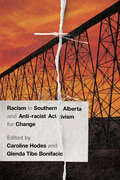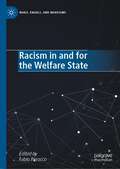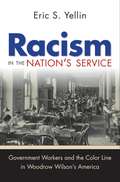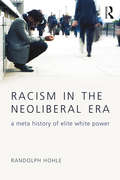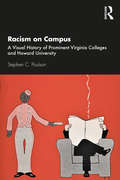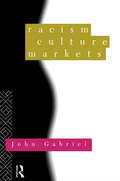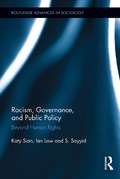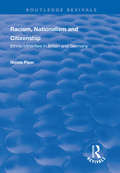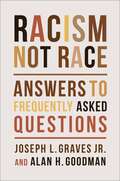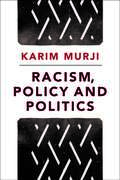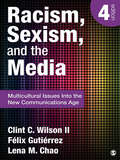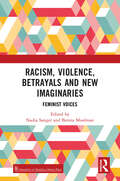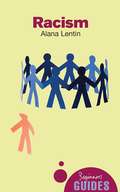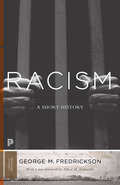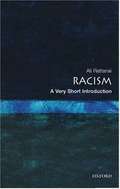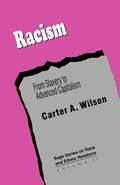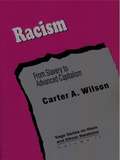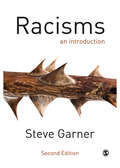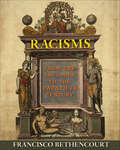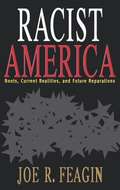- Table View
- List View
Racism in Southern Alberta and Anti-racist Activism for Change
by Glenda Tibe Bonifacio Caroline HodesDrawing on reflective personal narrative, experiential research, and critical theoretical engagement, this collection connects localized experiences with broader structural and systemic forms of intersectional racism. These detailed examinations of the various forms of racism faced by immigrants and Indigenous people living and working in Southern Alberta reveal how institutional racism continues to saturate modern Canadian culture and practice.
Racism in and for the Welfare State (Marx, Engels, and Marxisms)
by Fabio PeroccoThis book analyses politics, practices, and discourses of welfare racism against immigrants under neoliberalism. As an instrument of selection, exclusion, exploitation, and stigmatisation, welfare racism is a distinguishing feature of anti-immigrant racism which has gained new momentum over the last decades. The strength and persistence of this form of racism are linked to several factors, including the colonial roots of the welfare state, racism’s structural position in modern society, the intrinsic limits of social rights in capitalism, and migration policies that are almost always punitive in nature. Rich in documents and historical perspective, this book presents a global analysis of racism within and in the name of the welfare state. It examines discriminatory laws, measures, and practices by state actors and discourses by public figures and organizations, demonstrating the ways these developments are related to the dismantling of the welfare state in the neoliberal era, and to the war on labour and social rights. Integrating perspectives from Belgium, Brazil, Germany, Hungary, Israel, Italy, Japan, Spain, Sweden, the United Kingdom, and the United States, Perocco highlights welfare racism as a global and structured phenomenon producing inequalities and concerning labour as a whole.
Racism in the Canadian University
by Frances Henry Carol TatorThe mission statements and recruitment campaigns for modern Canadian universities promote diverse and enlightened communities. Racism in the Canadian University questions this idea by examining the ways in which the institutional culture of the academy privileges Whiteness and Anglo-Eurocentric ways of knowing. Often denied and dismissed in practice as well as policy, the various forms of racism still persist in the academy. This collection, informed by critical theory, personal experience, and empirical research, scrutinizes both historical and contemporary manifestations of racism in Canadian academic institutions, finding in these communities a deep rift between how racism is imagined and how it is lived.With equal emphasis on scholarship and personal perspectives, Racism in the Canadian University is an important look at how racial minority faculty and students continue to engage in a daily struggle for safe, inclusive spaces in classrooms and among peers, colleagues, and administrators.
Racism in the Nation's Service
by Eric S. YellinBetween the 1880s and 1910s, thousands of African Americans passed civil service exams and became employed in the executive offices of the federal government. However, by 1920, promotions to well-paying federal jobs had nearly vanished for black workers. Eric S. Yellin argues that the Wilson administration's successful 1913 drive to segregate the federal government was a pivotal episode in the age of progressive politics. Yellin investigates how the enactment of this policy, based on Progressives' demands for whiteness in government, imposed a color line on American opportunity and implicated Washington in the economic limitation of African Americans for decades to come.Using vivid accounts of the struggles and protests of African American government employees, Yellin reveals the racism at the heart of the era's reform politics. He illuminates the nineteenth-century world of black professional labor and social mobility in Washington, D.C., and uncovers the Wilson administration's progressive justifications for unraveling that world. From the hopeful days following emancipation to the white-supremacist "normalcy" of the 1920s, Yellin traces the competing political ideas, politicians, and ordinary government workers who created "federal segregation."
Racism in the Neoliberal Era: A Meta History of Elite White Power (New Critical Viewpoints on Society)
by Randolph Hohle<p>Racism in the Neoliberal Era explains how simple racial binaries like black/white are no longer sufficient to explain the persistence of racism, capitalism, and elite white power. The neoliberal era features the largest black middle class in US history and extreme racial marginalization. Hohle focuses on how the origins and expansion of neoliberalism depended on language or semiotic assemblage of white-private and black public. <p>The language of neoliberalism explains how the white racial frame operates like a web of racial meanings that connect social groups with economic policy, geography, and police brutality. When America was racially segregated, elites consented to political pressure to develop and fund white-public institutions. The black civil rights movement eliminated legal barriers that prevented racial integration. In response to black civic inclusion, elite whites used a language of white-private/black-public to deregulate the Voting Rights Act and banking. They privatized neighborhoods, schools, and social welfare, creating markets around poverty. They oversaw the mass incarceration and systemic police brutality against people of color. Citizenship was recast as a privilege instead of a right. Neoliberalism is the result of the latest elite white strategy to maintain political and economic power.</p>
Racism on Campus: A Visual History of Prominent Virginia Colleges and Howard University
by Stephen C. PoulsonDrawing on content from yearbooks published by prominent colleges in Virginia, this book explores changes in race relations that have occurred at universities in the United States since the late 19th century. It juxtaposes the content published in predominantly White university yearbooks to that published by Howard University, a historically Black college. The study is a work of visual sociology, with photographs, line drawings and historical prints that provide a visual account of the institutional racism that existed at these colleges over time. It employs Bonilla-Silva’s concept of structural racism to shed light on how race ordered all aspects of social life on campuses from the period of post-Civil War Reconstruction to the present. It examines the lives of the Black men and women who worked at these schools and the racial attitudes of the White men and women who attended them. As such, Racism on Campus will appeal to scholars of sociology, history and anthropology with interests in race, racism and visual methods.
Racism on Trial: The Chicano Fight for Justice
by Ian F. Haney López Ian Haney-LópezIn 1968, ten thousand students marched in protest over the terrible conditions prevalent in the high schools of East Los Angeles, the largest Mexican community in the United States. Chanting "Chicano Power," the young insurgents not only demanded change but heralded a new racial politics. Frustrated with the previous generation's efforts to win equal treatment by portraying themselves as racially white, the Chicano protesters demanded justice as proud members of a brown race. The legacy of this fundamental shift continues to this day. Ian Haney López tells the compelling story of the Chicano movement in Los Angeles by following two criminal trials, including one arising from the student walkouts. He demonstrates how racial prejudice led to police brutality and judicial discrimination that in turn spurred Chicano militancy. He also shows that legal violence helped to convince Chicano activists that they were nonwhite, thereby encouraging their use of racial ideas to redefine their aspirations, culture, and selves. In a groundbreaking advance that further connects legal racism and racial politics, Haney López describes how race functions as "common sense," a set of ideas that we take for granted in our daily lives. This racial common sense, Haney López argues, largely explains why racism and racial affiliation persist today. By tracing the fluid position of Mexican Americans on the divide between white and nonwhite, describing the role of legal violence in producing racial identities, and detailing the commonsense nature of race, Haney López offers a much needed, potentially liberating way to rethink race in the United States.
Racism, Culture, Markets
by John GabrielRacism, Culture, Markets explores the connections between cultural representations of `race' and their historical, institutional and global forms of expression and impact. John Gabriel examines the current fixation with market place philosophies in terms of the crisis in anti-racist politics and concern over questions of cultural identity. He explores issues such as the continuing relevance of terms like `black' as a basis for self definition; the need to think about identities in more fluid and complex ways, and the need to develop a much more explicit discussion of the construction of whiteness and white identities. Racism, Culture, Markets brings together a range of historical and contemporary case studies including the Rushdie affair; the Gulf War; debates around fostering, adoption and domestic violence; separate schooling; the service economy and its employment practices; tourism in the Third World; the Bhopal chemical disaster and racism in the new Europe. His case studies also consider the role played by contemporary media and popular culture in these debates, including film, television, music and the press.
Racism, Governance, and Public Policy: Beyond Human Rights (Routledge Advances in Sociology #112)
by Ian Law S. Sayyid Katy SianThis book presents a new framing of policy debates on the question of racism through a discursive critique of contemporary issues and contexts, drawing on a program of new European research carried out between 2010 and 2013, with a central focus on the UK. This includes analysis of the discursive construction of Muslims in three contexts: the workplace, education and the media. Informed by a fundamental critique of both the "post-racial" and the limitations of human rights strategies, it identifies the ongoing significance of contemporary raciality in governance strategies and develops a new radical agenda for addressing these processes, advocating strategies of "racism reduction."
Racism, Nationalism and Citizenship: Ethnic Minorities in Britain and Germany (Routledge Revivals)
by Nicola PiperFirst published in 1998, this book is about the consequences of the permanent settlement of former labour migrants in contemporary Germany and Britain and the extent to which these ‘new’ minorities are regarded as citizens in both societies as well as citizens of the European Union. It is argued that a socio-historical link between processes of racialization and nationalism lead to an exclusionary concept of citizenship in both countries. This link is concretized by the intermingling of nationality and citizenship as reflected in law and/or in the perception by civil society. Thus, the concept of citizenship can only function as a mechanism for inclusion of ethnic minorities if de-linked from nationality (i.e. ethnic descent). In addition, recent supra- and sub-national development on the EU level lead to the suggestion of a three-layered conception of citizenship (i.e. local, national, European), and it is argued that the local level is probably the most effective to resist the power of racism and nationalism.
Racism, Not Race: Answers to Frequently Asked Questions
by Alan H. Goodman Joseph L. Graves Jr.The science on race is clear. Common categories like “Black,” “white,” and “Asian” do not represent genetic differences among groups. But if race is a pernicious fiction according to natural science, it is all too significant in the day-to-day lives of racialized people across the globe. Inequities in health, wealth, and an array of other life outcomes cannot be explained without referring to “race”—but their true source is racism. What do we need to know about the pseudoscience of race in order to fight racism and fulfill human potential?In this book, two distinguished scientists tackle common misconceptions about race, human biology, and racism. Using an accessible question-and-answer format, Joseph L. Graves Jr. and Alan H. Goodman explain the differences between social and biological notions of race. Although there are many meaningful human genetic variations, they do not map onto socially constructed racial categories. Drawing on evidence from both natural and social science, Graves and Goodman dismantle the malignant myth of gene-based racial difference. They demonstrate that the ideology of racism created races and show why the inequalities ascribed to race are in fact caused by racism.Graves and Goodman provide persuasive and timely answers to key questions about race and racism for a moment when people of all backgrounds are striving for social justice. Racism, Not Race shows readers why antiracist principles are both just and backed by sound science.
Racism, Policy and Politics
by Karim MurjiRace has been a prominent public policy issue in the UK for decades and there is growing interest in academia, but it is often caught in a repetitive cycle of progress and regress. This book analyses and bridges that gap by providing a unique insight into the relationship between race and ethnicity scholarship and the reality of ‘real world’ policy and politics. Drawing on the author’s academic work as well as his background working in public policy bodies, it goes beyond ‘impact’ debates, public sociology, diversity and post-race, to examine the changing context for researching race and racism, including media and policy debates and the ways in which institutional racism has played out in public policy settings since the Stephen Lawrence inquiry. Combining theory and applied policy analysis in an accessible way, it guides the reader through the cultural and political changes in race and racism in recent decades and identifies the challenges and opportunities for policy and politically-engaged scholarship in future, clearly mapping the pitfalls and possibilities for critical work on race and racism. .
Racism, Sexism, and the Media: Multicultural Issues Into the New Communications Age
by Felix Gutierrez Lena M. Chao Clint C. WilsonAs our society becomes increasingly diverse, racial, ethnic, and gender inclusiveness and equality have taken on new life in the United States. The Fourth Edition of Racism, Sexism, and the Media examines how different race, ethnic, and gender groups fit into the fabric of America; how the media influence and shape everyone′s perception of how they fit; and how the media and advertisers are continuously adapting their communications to effectively reach these groups. The authors explore how the rise of class/group-focused communication, resulting from the convergence of new media technologies and continued demographic segmentation of audiences, has led media outlets and advertisers to see women and people of color as influential key audiences and target markets, as well as a source of stereotypes, which may lead to media insensitivity and may help perpetuate social inequity. The Fourth Edition includes updated content on topics covered in the previous editions, such as film, television, radio, print media, advertising, and public relations. It also incorporates new material on: women of color, including an integrated assessment of their media experiences; new material on Muslim, Arab, and Asian groups; new technologies; and social media use and their impact. Presented in a logical, easy-to-follow format, this text offers readers an enhanced and expanded understanding of how women and minorities in the United States shape and are shaped by today′s media environment.
Racism, Violence and Harm: Ideology, Media and Resistance (Palgrave Studies in Crime, Media and Culture)
by Monish Bhatia Scott Poynting Waqas TufailThis book examines connections between racism, violence, and social harms, along with the parts played by media actors and institutions in sustaining these phenomena. The chapters present instances of racism from numerous countries in connection with state violence, media coverage of harms and violence against racialised others, including Roma, Palestinians, Indigenous Australians, Maori, African Americans, Mexican Americans, Muslim peoples, Black people in Portugal, Middle-Eastern people in Australia, and asylum seekers. The chapters analyse ideology while paying attention to history and global context, tracing intersectional dynamics including nexuses of racism, class, and gender. They focus on various aspects of violence, including state, colonial and imperialist violence and ideological violence. The book is necessarily interdisciplinary, but explicitly anti-racist and attentive to resistances. It traverses criminology, sociology, cultural studies, postcolonial studies, media studies, history, and cognate fields.
Racism, Violence, Betrayals and New Imaginaries: Feminist Voices
by Nadia Sanger Benita MoolmanThis anthology consists of academic essays, creative non-fiction, poetry and short stories on race and racism by black women from South Africa and Brazil. Through these different genres, the book engages with the complexities of race in social, political, economic, institutional and personal spaces. Concerned with social justice, human rights and freedom, these writings spotlight the amalgamation of racial, gender and class subjectivities and how these are marked, un-marked, re-marked and re-made on bodies. The book connects globally and locally to social and political phenomena in the modern-day world. The contributors interrogate their political and personal worlds, revealing layered, intersecting ways of being that were essentially centred by colonial histories but not defined in totality by coloniality and oppression. In speaking to the proximity of these experiences, they reflect and narrate the past, contemplate the present and imagine the future. This curated anthology asks questions centred around freedom. What does freedom mean? When do we have it, and when do we not? Most importantly, how do we get it? Print edition not for sale in Sub Saharan Africa.
Racism: A Beginner's Guide (Beginner's Guides #5)
by Alana LentinDespite the fact that we've spent hundreds of millions of dollars promoting tolerance, racism is still prevalent today. In fact, since 9-11 the subject of race, and exactly what this means, has become more important than ever before. Alana Lentin traces the development and mutation of ideas about race, through political history right up to modern debates about ethnicity and xenophobia, and considers the implications of a 'raceless' society amid concerns about diluted traditions and identities. Thought-provoking and intelligent, this invaluable resource exposes the roots of racist thought, and reveals how it has remained a part of our everyday lives. Alana Lentin is Lecturer in Sociology at the University of Sussex, UK.
Racism: A Short History
by George M. Fredrickson Albert CamarilloAre antisemitism and white supremacy manifestations of a general phenomenon? Why didn't racism appear in Europe before the fourteenth century, and why did it flourish as never before in the eighteenth and nineteenth centuries? Why did the twentieth century see institutionalized racism in its most extreme forms? Why are egalitarian societies particularly susceptible to virulent racism? What do apartheid South Africa, Nazi Germany, and the American South under Jim Crow have in common? How did the Holocaust advance civil rights in the United States? With a rare blend of learning, economy, and cutting insight, George Fredrickson surveys the history of Western racism from its emergence in the late Middle Ages to the present. Beginning with the medieval antisemitism that put Jews beyond the pale of humanity, he traces the spread of racist thinking in the wake of European expansionism and the beginnings of the African slave trade. And he examines how the Enlightenment and nineteenth-century romantic nationalism created a new intellectual context for debates over slavery and Jewish emancipation. Fredrickson then makes the first sustained comparison between the color-coded racism of nineteenth-century America and the antisemitic racism that appeared in Germany around the same time. He finds similarity enough to justify the common label but also major differences in the nature and functions of the stereotypes invoked. The book concludes with a provocative account of the rise and decline of the twentieth century's overtly racist regimes--the Jim Crow South, Nazi Germany, and apartheid South Africa--in the context of world historical developments. This illuminating work is the first to treat racism across such a sweep of history and geography. It is distinguished not only by its original comparison of modern racism's two most significant varieties--white supremacy and antisemitism--but also by its eminent readability.
Racism: A Very Short Introduction
by Ali RattansiFrom subtle discrimination in everyday life, to horrors like lynching in the Old South, cultural imperialism, and "ethnic cleansing," racism exists in many different forms, in almost every facet of society. Despite civil rights movements and other attempts at progress, racial prejudices and stereotypes remain deeply embedded in Western culture. Racism takes a frank and objective look at why these notions exist. It explores how racism has come to be so firmly established, and looks at how race, ethnicity, and xenophobia are related. This book incorporates the latest research to demystify the subject of racism and explore its history, science, and culture. It sheds light not only on how racism has evolved since its earliest beginnings, but also explores the numerous embodiments of racism, highlighting the paradox of its survival, despite the scientific discrediting of the notion of 'race' with the latest advances in genetics. As encompassing as it is concise, Racism is a valuable guide to one of the world's most destructive problems.
Racism: From Slavery to Advanced Capitalism
by Carter A. WilsonRacism: From Slavery to Advanced Capitalism, is an important example of how much new ground must be broken in regard to the historical social scientific study of racism,
Racism: From Slavery to Advanced Capitalism
by Dr Carter A. WilsonAn explanation of the phenomenon of racism throughout history is sought in this book. Carter A Wilson draws on and integrates the considerable literature on racism which has originated from economic, political and cultural realms. In doing so he addresses four major goals: to resolve the major debates surrounding racism; to demystify racism; to provide an understanding of how racism has been sustained in various historical eras; and to discuss how racism takes on different forms throughout history.
Racisms
by Dr Steve GarnerWe hear much about 'race' and 'racism' in public discourse but the terms are frequently used without clear definitions or practical examples of how these phenomena work. Racisms introduces practical methods which enable students to think coherently and sociologically about this complex feature of the global landscape. Steve Garner argues that there is no single monolithic object of analysis but rather a plural set of ideas and practices that result in the introduction of 'race' into social relations. This differs over time and from one place to another. Focussing on the basics, Racisms: * Defines 'race', 'racism', 'institutional racism' and 'racialization' * Provides examples of how these function in fields like the natural sciences and asylum. * Clearly sets out theoretical arguments around collective identities ('race', class, gender, nation, religion). * Uses empirical case studies, including some drawn from the author's own fieldwork * Points students and other readers toward sources of further web and text based information. Engaging and accessible this book provides a signposted route into key elements of contemporary debates. Racisms is an ideal introduction for undergraduates studying 'race' and ethnicity, social divisions, stratification, and social work.
Racisms: An Introduction
by Steve GarnerCombining key theoretical perspectives with contemporary case studies, this text will be invaluable in helping you to fully understand the complex issue of racism. With clear definitions and practical examples this is a solid resource when seeking to examine the way in which racisms have become part of social practices and institutions. Providing a clear and readable introduction to all of the key concepts, theories and debates, this fully revised new edition: Includes new chapters on Ethnicity and Immigration Has 30 new boxed case studies with a more international focus Contains new learning features including further reading and questions for reflection Racisms is an ideal introduction for undergraduates studying race and ethnicity, social divisions and stratification.
Racisms: An Introduction
by Steve GarnerCombining key theoretical perspectives with contemporary case studies, this text will be invaluable in helping you to fully understand the complex issue of racism. With clear definitions and practical examples this is a solid resource when seeking to examine the way in which racisms have become part of social practices and institutions. Providing a clear and readable introduction to all of the key concepts, theories and debates, this fully revised new edition: Includes new chapters on Ethnicity and Immigration Has 30 new boxed case studies with a more international focus Contains new learning features including further reading and questions for reflection Racisms is an ideal introduction for undergraduates studying race and ethnicity, social divisions and stratification.
Racisms: From the Crusades to the Twentieth Century
by Francisco BethencourtA groundbreaking history of racismRacisms is the first comprehensive history of racism, from the Crusades to the twentieth century. Demonstrating that there is not one continuous tradition of racism, Francisco Bethencourt shows that racism preceded any theories of race and must be viewed within the prism and context of social hierarchies and local conditions. In this richly illustrated book, Bethencourt argues that in its various aspects, all racism has been triggered by political projects monopolizing specific economic and social resources.Racisms focuses on the Western world, but opens comparative views on ethnic discrimination and segregation in Asia and Africa. Bethencourt looks at different forms of racism, and explores instances of enslavement, forced migration, and ethnic cleansing, while analyzing how practices of discrimination and segregation were defended.This is a major interdisciplinary work that moves away from ideas of linear or innate racism and recasts our understanding of interethnic relations.
Racist America: Roots, Current Realities, and Future Reparations
by Joe R. Feagina look at the history and ideology of racism in America.
